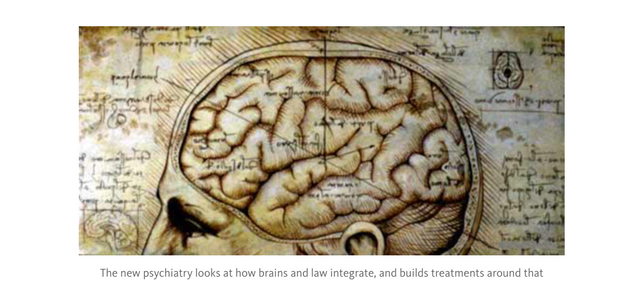Redefining mental illness as “law-integration disorder”
In Genes, Memes, Culture and Mental Illness, Hoyle Leigh identifies memes that inhibit or attenuate the executive (ego) function as the cause of mental illness, making it difficult for the individual to absorb, process and integrate information.
Legal systems such as representative government evolved as to detach law from the confines of human brains, allowing law to scale without the limitations of gene-based imperatives and making it possible for human cultures to grow beyond dunbar’s number. The nation-state legal system has limited computational capacity, and therefore uses coercive law, a social contract where individuals are registered at birth like animals and coerced into integrating the laws into their brains as they mature into adulthood.
Coercive law does not integrate at all with inner mediation, and is instead constantly fought off the way a body would reject an implant. In the 19th century when males were legal masters, Hysteria developed in females as a law-integration disorder, and was treated by inducing an orgasm and guiding the subject to pretend like their problems were not real. In the mid 20th century when straight people were legal masters, law-integration disorder afflicted the gay population who were forced to live either pretending to be straight, or choose between undergoing chemical castration or the mad house.
With advances in crypto-economics and crypto-law, using computers to augment the legal infrastructure of humankind, the increase in computational capacity could lead to a legal system based on voluntary law, which integrates better with the brain, potentially eradicating law-integration disorders, in the same way that female voting rights eradicated what was called Hysteria.

Towards a re-definition of mental illness as "law-integration disorder"
The microscope, Pasteur, and bacteriology gave 19th century medical scholars an understanding of infection, what caused it, and led to increasingly better treatments. In the same way, a better understanding of what causes mental disorder further leads to increasingly better treatments.
The Journal of the Royal Society of Medicine wrote in Is Psychiatry a Religion (2008) that
It may sound bizarre to suggest that those working in psychiatry are somewhat akin to missionaries, but anyone with access to an Internet search engine will soon discover that this is indeed a common self-conceptualization.
Law is an extension of the human brain, used to co-ordinate multiple brains
As long as laws needed the brain, and therefore, the genes to survive and propagate, laws that were loudest in ordering genes to replicate them had a survival advantage. Such laws would propagate by threatening annihilation of the genes on one hand and promising “eternal life” on the other, religion being prime examples.
With legal systems, laws are freed from the confines of brains that are dependent on gene multiplication, and there is less need for laws to co-opt genes for their purpose, leading to new ways of mediating human attention, new incentive systems.

“Law-integration disorder” can be cured through finding ways to integrate
Coercive law and representative government has made it possible to organize human society at a scale that far out-shines the tribal society of the stone age. Without it, there would be no technology, no iPhones, no music, no art, literature or Netflix.
To be human today is synonymous with being part of the modern technological society.
Based on the computation resources that exist in the nation-state, with human brains and politicians used as the infrastructure to maintain consensus, it has not been possible to build a society which was built on voluntary social contracts.
Law-integration disorder can be cured either by realizing these fundamental limitations to how society can be organized, or, by changing the rules through revolution.

Religions, such as psychiatry, prevent the brain from coming to terms with the social contract, and instead produce an other-wordly escape. Law-integration disorder cannot be cured with psychiatry, lithium, anti-psychotics, anti-depressives etc, but through either a fight response, pushing the brain to understand the world and potentially changing it, or psychedelics which re-program the root systems of the brain. The brain needs the pain to be motivated to integrate, it needs the fever, and things like major-tranquilizers prevent that.
By shifting focus from the problem being a mental one, to it being a problem of law-integration, a law-integration disorder, a better understanding can be made which can guide people to more successfully navigate the world and their lives. This shift in terminology also prepares the world for polycentric governance systems, and an age where the brain will be able to choose laws based on the types of consciousness that those laws would allow.

The brain, as a distributed computation system, builds models of both itself and others, and the word "law-integration disorder" shifts attention to the infection which causes mental disorder, and will allow 21st century psychiatrists and medical scientists to develop better treatments, and to communicate better with other fields which affect the health of individuals suffering from law-integration disorder.
The Journal of the Royal Society of Medicine identified the religious-like qualities of psychiatry as a major problem, and this shift in terminology forces the brain to view the infection which causes mental disorder in its entirety, and applies a force onto the source of the infection, the law.
The term law-integration disorder removes authority from pseudo-psychiatric practices, and acts as a constant reminder that when for example a woman in the 19th century was suffering from Hysteria, it was the result of a consensus which was supported by her peers, and that the real solution would not be to induce an orgasm, but rather to face reality and to come together and change the consensus.
The term law-integration disorder makes it easier in a complex legal system to see the other as ourself, and it is ideologically agnostic, and recognizes that to someone suffering from law-integration disorder, revolution or rebellion has potentially as good or better outcome than working towards integration. Most of all, it protects individuals from the damaging rituals within old psychiatry and the catch 22s they produce.
Altruism is the moral foundation of psychiatry - Nygren, J
how about redefining psychiatry as neurological totalitarianism. the only cure to which is self defense by any and all means possible, up to and including the complete annihilation of all psychiatrists?
It's better to redefine it to explain why it has been neurological totalitarianism.
i'd rather abolish it's practice and all of it's practitioners from space-time, as it and they are the pure manifestation of violence against individual natural rights.
I've tried to redefine it to explain why it has been neurological totalitarianism. I often compare it to how 19th century medical science failed to understand infections and worsened them, and how that was natural because society was organized in certain ways and technologies which were required to progress had not yet developed.
From New Psychiatry: Towards a 21st century model of mental health,
i have no need to be ruled. i have no need of psychology, which is more superstition than science. i have no need of law, except the understanding of natural law and my relation to it. we have the knowledge and the technology now, and yet people continue to fall victim to ignorance of how they go together. they also fall victim to how society is organized through socialized healthcare, the regulatory capture structure of the FDA and the large, moneyed corporate interests, spliced together by lobbyists, insurance companies, and medical licensing. it would take hours to go into how each of these aspects define and reinforce each other. on top of all this, psychiatry is a medical practice built atop a made up science. psychology is based on consensus, science is not. psychiatry is based on , using toxic chemicals to modify behavior, not, to bring about proper function. to elicit the desired reaction, rather than to allow healthy equilibrium to be established.
law, medicine, and psychology should never be brought within a hundred miles of one another.
Yes psychiatry is made up science, but it is as natural as the made up medical science in the 19th century was. Laws are also natural, and for human society to scale beyond small tribes of 150 people, so that technology could evolve and the industrial revolution could happen, rule-of-law had to happen and it is what makes the social system we live in possible. Anyone who uses modern technology, made possible by complex inter-connected social systems, makes use of rule-of-law because they use technology which has grown from it.
We have the knowledge and technology now to gain a better understanding of how humans, cultures, and technologies interact, and "new psychiatry" reflects that, and I developed it as a transitional framework to be used while the web 3.0 is developed over the next decade.
The "new psychiatry" framework is based on Hoyle Leigh's Genes, Memes, Culture and Mental Illness: Towards an Integrative Model (2010)